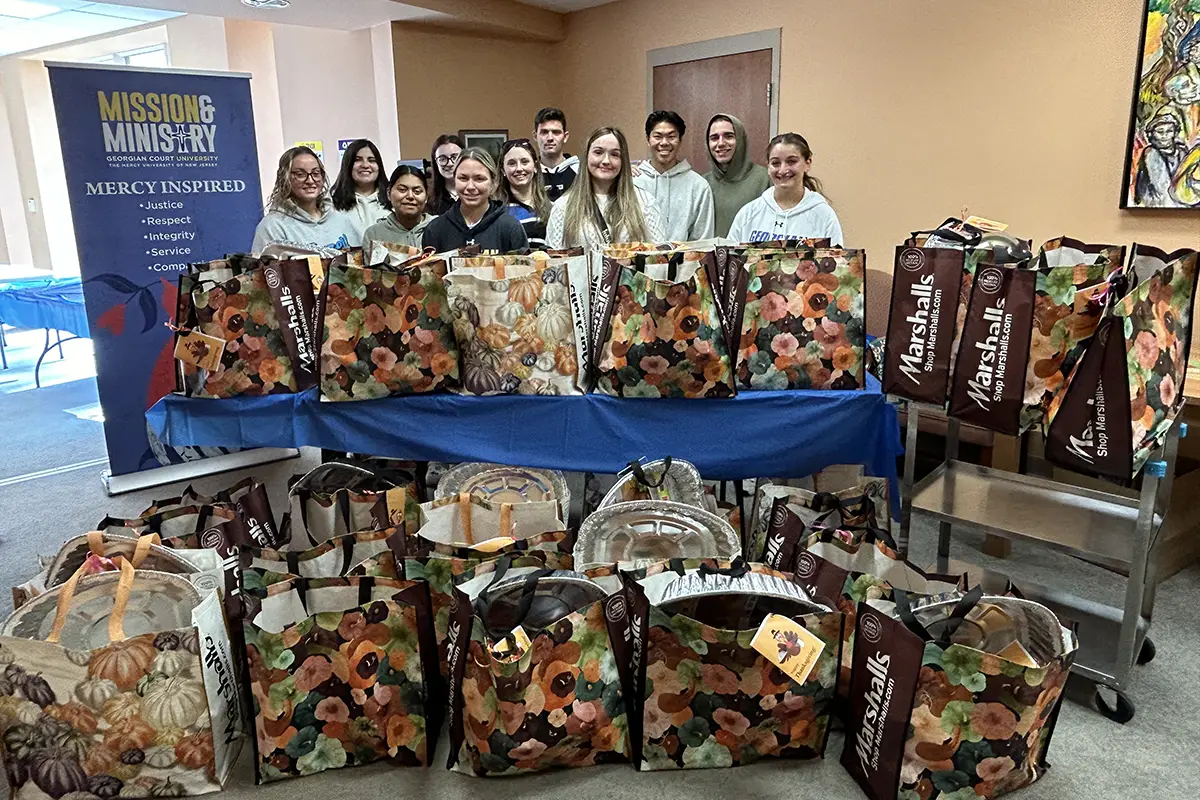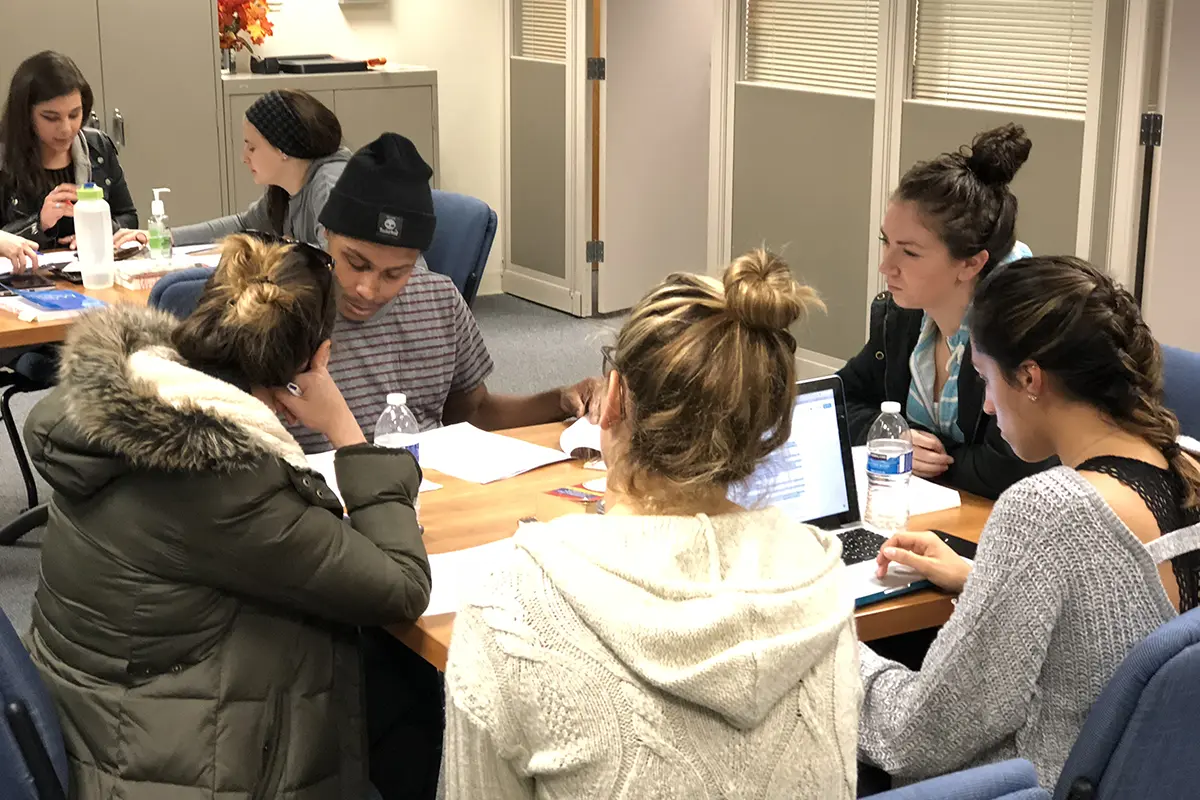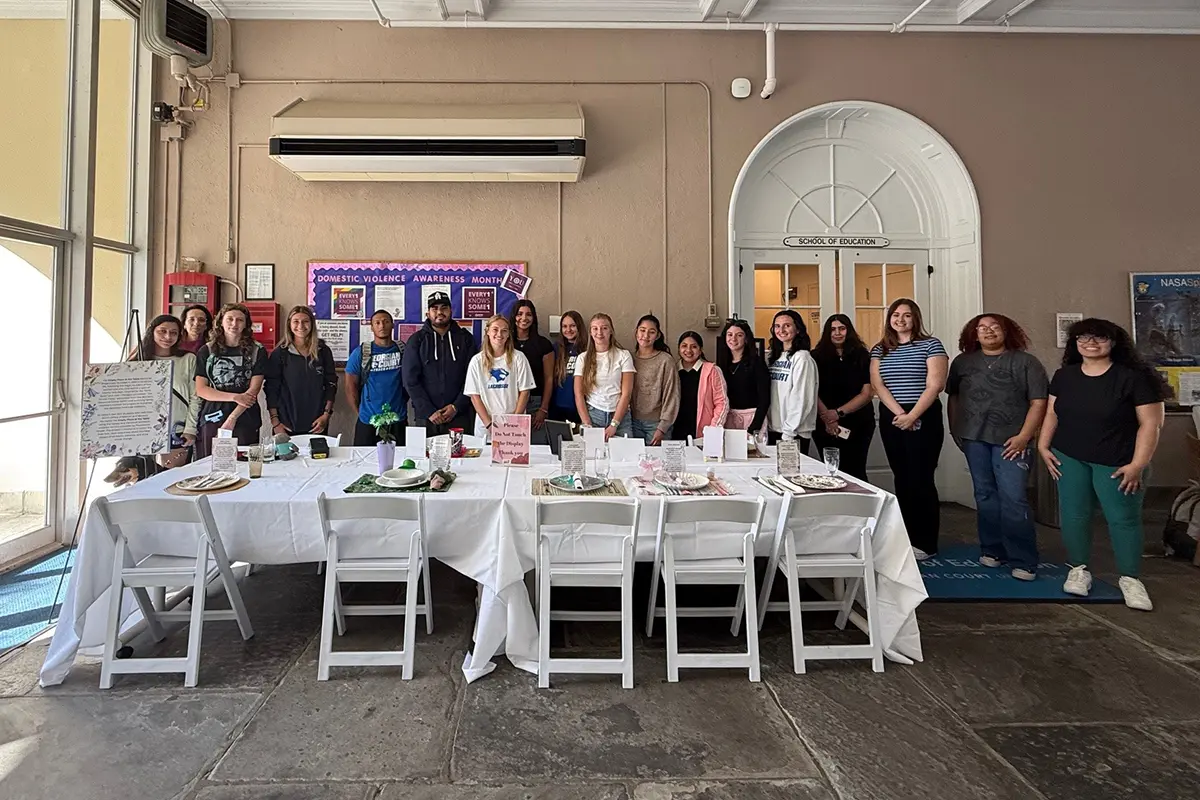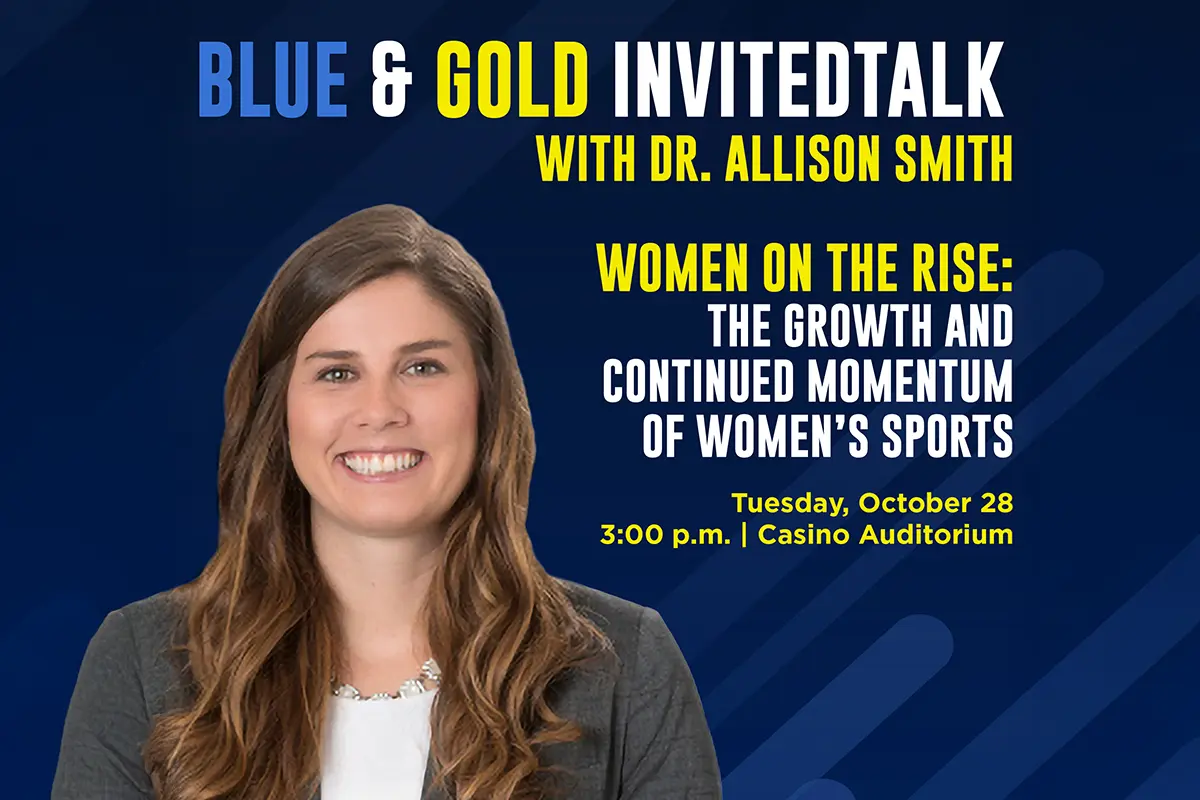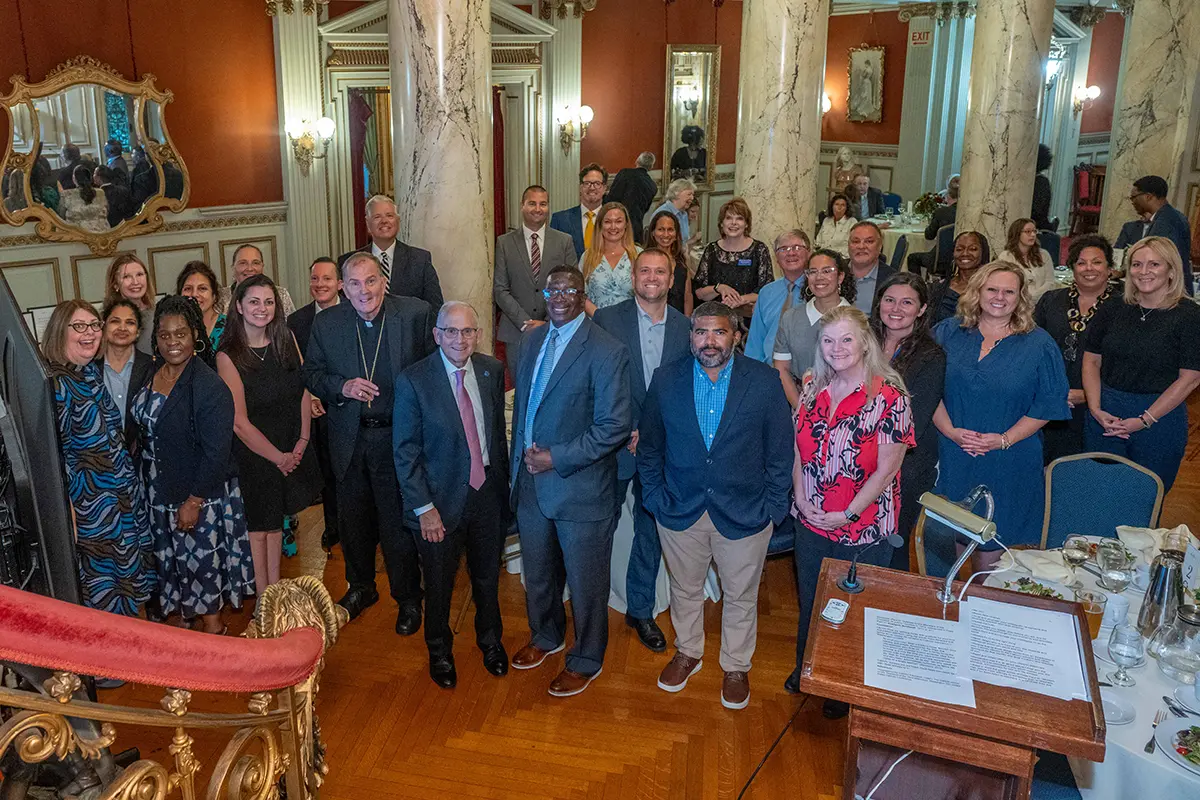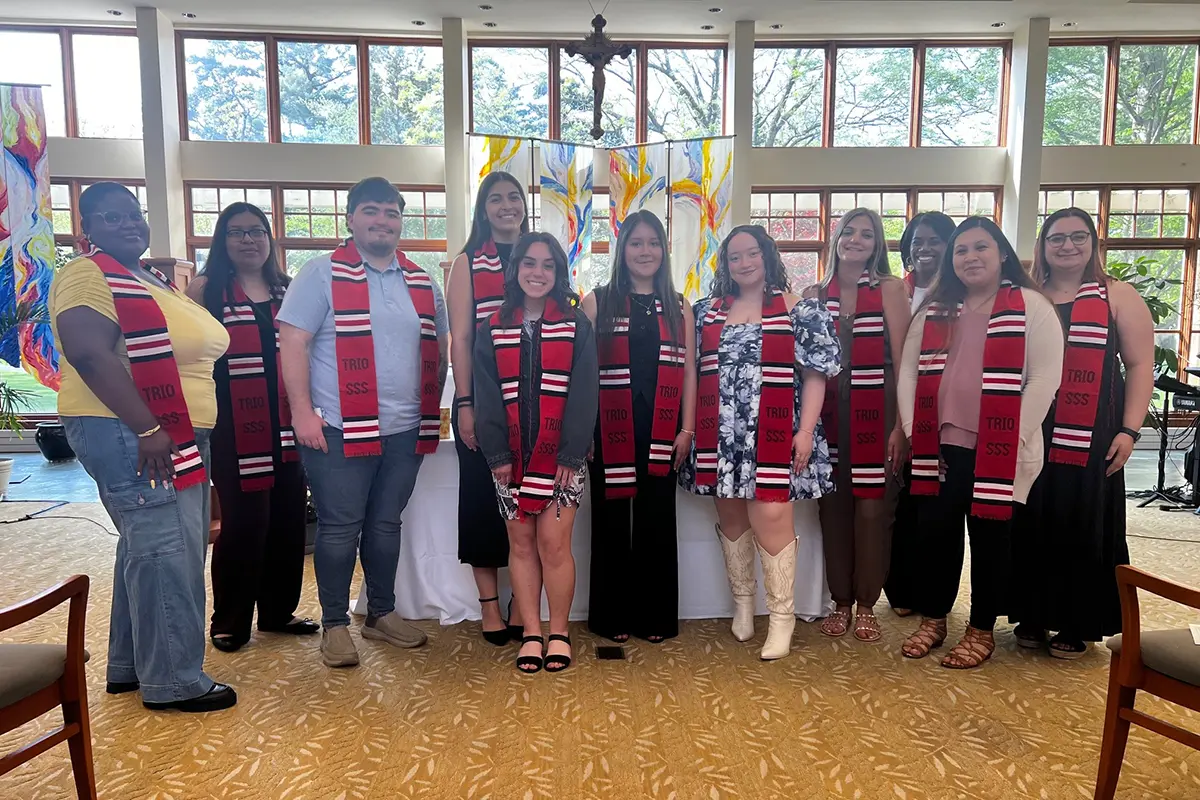Estimated reading time: 5 minutes
Food is an important part of holiday celebrations, but for many, just having enough to meet their daily needs is a challenge. The U.S. Department of Agriculture reports that nearly 1 million people in New Jersey are suffering from food insecurity.
To shed light on the growing issue of food insecurity and inequity and provide opportunities to make a difference by helping those in need, the Office of Mission & Ministry coordinates a series of educational and service activities on campus during National Hunger & Homeless Awareness Week.
One longtime campus tradition is the annual Thanksgiving Food Basket Drive. Student volunteers sorted and packed cans, boxes, and bottles of items like stuffing, vegetables, apple juice, cranberry sauce, muffin and cake mix, and more, into 40 giant reusable grocery bag “baskets.” The students then adorned each basket with a holiday card and wrote a personalized message. The baskets were donated for distribution to local families by Interfaith Family Services (Toms River) and Providence House-Ocean County (Whiting), a service of Catholic Charities. Providence House and Interfaith serve women and families experiencing domestic violence in Ocean County. (View photos)
“We are extremely grateful to the entire campus community, and in particular the student-athletes for their efforts and contributions to the food drive, which resulted in the collection of more than 400 non-perishable food items,” said Amy Cerreta, GCU Campus Minister and holiday activities coordinator.
Professor of Religious Studies and Theology Johann Vento, Ph.D., and her Gen 400 students were among the volunteers. “Community service is embedded in the course and students have been working on individual projects, but we came together as a group to do this service together.” She added, “It was a great experience, and they were very helpful. It was a good reminder that Thanksgiving dinners don’t just materialize and that not everyone has the resources to give a holiday meal to their family.”
Gen 400 student Kaitlyn Romero, a senior majoring in psychology and early childhood education, found the project enlightening. “It was very cool to be able to see the process of putting the baskets together and see how much work really goes into it. This goes way beyond just dropping your donation in a box.” She added, “I thought it was a really enriching experience. It was eye-opening to get a grasp of how many people in your community can use a service like this, and it makes you appreciate what you have even more.”
Student volunteers also made 120 lunch bags that were donated to St. Peter’s Free Community Lunch Program, which serves families in Freehold Borough and surrounding communities. Each bag contained one peanut butter and jelly sandwich, one tuna sandwich, applesauce, chips, a granola bar, water, napkins, and spoons. (View photos)
New this year was the GCU Oxfam Hunger Banquet, an immersive and experiential learning event designed to draw attention to and encourage discussion about food inequity in the world. Over 115 students, staff, and faculty members took part in the banquet as participants, observers, and volunteers. The banquet program was facilitated by Dr. Tawanda Hubbard, a Rutgers Associate Professor and Licensed Clinical Social Worker, who gave an overview of hunger and food inequity, followed by the banquet experience. (View photos)
Guests randomly received table tickets labeled high-income, middle-income, and low-income. Each area was hidden by a curtain until the guests were seated. The high-income guests sat at an elegantly decorated table and waiters served them spaghetti and meatballs, salad, and dessert. Sitting at folding tables and chairs, the middle-income guests served themselves rice and beans from a family-style chaffing dish and had a cookie for dessert. Lower-income guests had to sit on the floor on mats, one person gathered the food for each group and then each person had to scoop out their rice from that bowl with a cup and eat without utensils.
Psychology majors Emma Pease and Brenna Gull, both seniors, acted as observers taking notes on people’s reactions and discussions during and after the event. “There were a lot of different reactions, disappointed faces, confusion, and people asking to switch. They warned everyone that it would be uncomfortable, but it was important that they be fully immersed in the experience,” explained Pease.
Gull added, “It taught everyone a lesson about poverty and hunger that no other regular presentation could because it was so realistic, personal, and hands-on. Hopefully, it will spark some empathy for people who experience food inequity every day.”
For Pease and Gull, the impact of this experience was immediate and powerful. “It made us more aware of how big a problem hunger is in the world, and it definitely motivated us to volunteer to help with the Thanksgiving baskets this year and to do more within our campus community,” remarked Gull.
Gen 100 students also had an opportunity to learn about food inequity during a special lecture presentation by a representative from Fulfill, a food pantry that serves Monmouth and Ocean Counties. Fulfill also worked with student volunteers to provide resources for a hunger awareness table in Jeffries Hall. GCU partners with Fulfill to provide access to a monthly Mobile Food Pantry that provides fresh fruit, vegetables, dairy, and nutritional foods to the university and local community.
“A lot of Mercy core values go back to service and respect and having integrity,” said Romero. “I think that helping to fill the Thanksgiving baskets is a really great example of that, especially the service aspect of helping somebody who is less fortunate than you are.”
In an effort to help fight food insecurity on campus, the Campus Ministry runs Julian’s Cupboard Student Food Pantry, open to all students and accessible in Mercy Hall during office hours or through an online order form. The Food Pantry will be open on Tuesday, Nov. 26 from 9 a.m. – 2 p.m.

